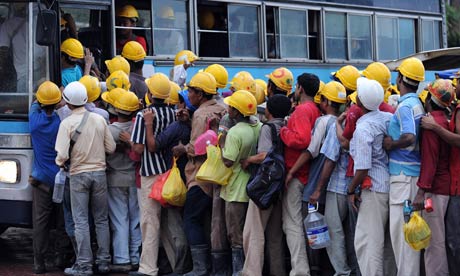
Burmese migrant workers: caught between a tyrant and a tiger
Malaysia's economic boom has been driven by the exploitation of cheap migrant labour, from Burma and Thailand. Underpaid and with no rights, this is their story

They were not illegal, nor criminals, not protesting nor agitating. For 900 Malaysian ringgits (around $290) a month they had travelled, through a broker, to the southern Malaysian town of Johor. There to bend the metal, mould the bars and solder the nuts that will bolt together the terrific rise in Asia's economies.
However the 35 Burmese workers found that, after two months, instead of the promised amount, they were to receive 640 a month, with no overtime pay, as promised.
So the workers organised, led by five individuals. They initially complained to their employers.
The employers immediately called the police, all 35 were detained on 12 January. No charges were brought, and 30 were released that day.
"Whenever workers do actually complain to their employers or against [them], employers tend to discriminate against them or even terminate [their contracts]," says pioneering Malaysian human rights lawyer, Charles Hector.
Before any legal rationale could be brought, or advocates or government bodies mobilised, the five leaders were whisked away to the airport for deportation, because, as Hector notes, "the employer wins by default if they are deported", they cannot compete in a labour dispute, and migrant workers are not allowed to be members of a union or stay in Malaysia without employment.
Out of the five leaders who complained, three have been forced back to Burma despite signing a three-year contract, two, however are missing.
Malaysia's growing "tiger economy", is driven by a workforce of around 20% migrant labour, with an estimated 500,000 from Burma, many of them illegal, taking their place at the bottom of Malaysia's semi-apartheid ethnic mix.
With GDP per capita hard to record in Burma, the IMF estimated in January 2009 that it was around $250. This compares with the IMF's 2010 estimate for Malaysia of $7,775.
Despite a constitution and laws pertaining to universal rights in Malaysia, law enforcement and other political precedence places migrant workers at immediate disadvantage. All companies in Malaysia that hire foreign labour are required to pay a levy. This is very often deducted from workers' pay, even though the practice was made illegal in April 2009.
Tun Tun, head of Burma Campaign Malaysia, notes that the overwhelming ethos is for employers to take responsibility for their workers as opposed to the workers having rights as individuals. He points out that when you arrive in Malaysia as a tourist, you need no visa and can rapidly leave the airport. However, migrant workers have to wait for their employer to pick them up and take them, in custodial fashion, to wherever they please.
Not all Burmese are just economic migrants. Many of those who eke out a living between the concrete apartment buildings and highways of Kuala Lumpur have fled political oppression in their homeland.
Kyaw Hsan was jailed in Burma at the age of 15. His "crime" was distributing pamphlets about democracy, with news and information that circumvented Burma's draconian military censors. He would leave pamphlets on the roof of a bus, so as it drove through the streets of Rangoon they would flutter down, as innocently as freshly falling rain. He was picked up outside a meeting of Aung San Suu Kyi's National League for Democracy on 16 September 2000.
His confinement was marked with weeks of torture, including night-long beatings by teams of guards. This was followed, in 2003, by periods of up to 32 days chained to a wet floor with dozens of other prisoners for protesting the rearrest of Aung San Suu Kyi.
He contracted tuberculosis, which quarantined him for a further year after his release from Rangoon's colonial-era Insein jail.
Beyond the scars marking his body, and despite his affable nature, the psychological toll is unmistakable. At the time of writing, a combination of dislocation, alcohol and the breakdown of a relationship had led to angry outbursts, which saw him lose his job as a waiter.
In exile
The isolation is palpable in divided Kuala Lumpur. On a busy rush hour Kyaw Hsan intervenes to protect a young Burmese who has been set upon by up to a dozen Malays. They beat him and take his phone, but he mistrusts the police so much that a foreign escort to the station to report it is deemed necessary.
Ko Harun, meanwhile, has weathered exile for longer. He fled his native Burma because of thediscrimination faced by the Rohingya minority. The Rohingya, he estimates along with many observers, are the most oppressed minority in Burma; despite having been in the country for about 1,000 years, they are denied citizenship rights.
Since he left Burma he has been arrested four times in Thailand and five times in Malaysia. In Thailand he says he was caged up with gang members who would violently steal his rations.
He has been "sold" to traffickers by Thai officials, after being handed over by Malaysian authorities. He was lucky enough to be able to borrow the fee to remove himself from bondage.
Conditions in Malaysian jails are horrendous, causing what the Malaysian press call riots but are actually hunger strikes or peaceful protests, complaining about the overcrowding, the constant outbreaks of leptospirosis, a disease caused spread through urine-contaminated water, or simply the length of detention.
The two missing worker leaders have not been heard from. Like an estimated 190,000 other Burmese in Malaysia, they are at the mercy of a divided, hungry nation.
• Joseph Allchin is a journalist with the exiled Burmese news network the Democratic Voice of Burma.
See also earlier posts:-



